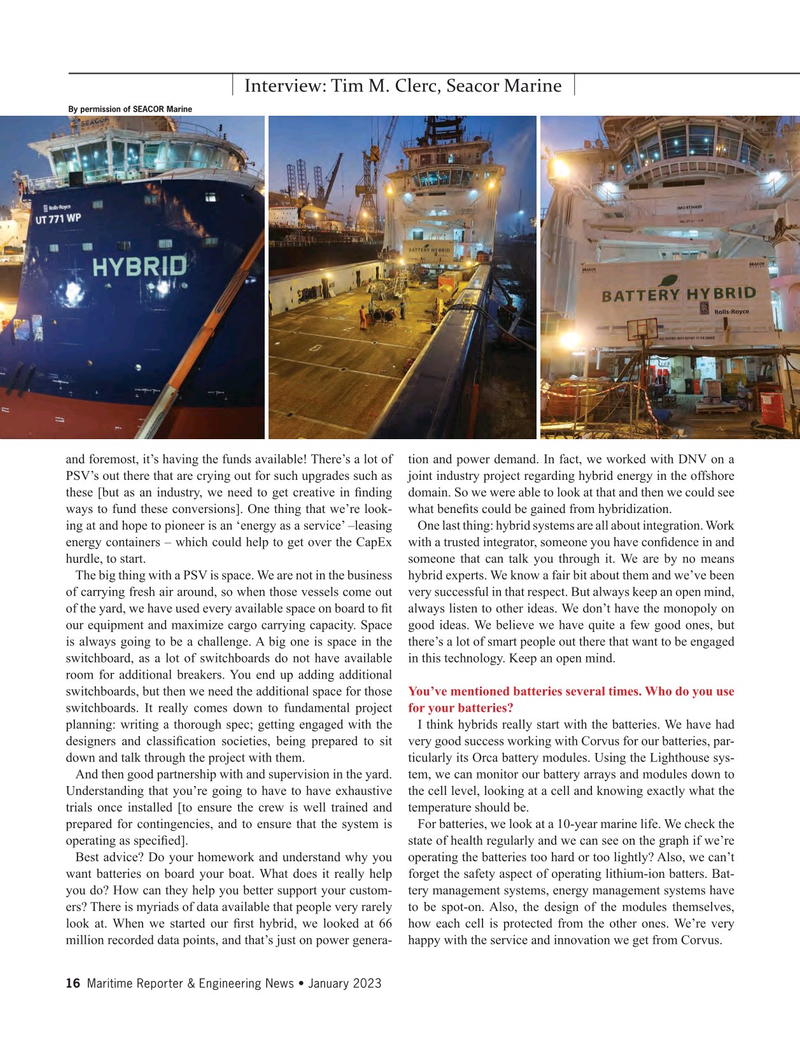
Page 16: of Maritime Reporter Magazine (January 2023)
The Ship Repair & Conversion Edition
Read this page in Pdf, Flash or Html5 edition of January 2023 Maritime Reporter Magazine
Interview: Tim M. Clerc, Seacor Marine
By permission of SEACOR Marine and foremost, it’s having the funds available! There’s a lot of tion and power demand. In fact, we worked with DNV on a
PSV’s out there that are crying out for such upgrades such as joint industry project regarding hybrid energy in the offshore these [but as an industry, we need to get creative in ? nding domain. So we were able to look at that and then we could see ways to fund these conversions]. One thing that we’re look- what bene? ts could be gained from hybridization.
ing at and hope to pioneer is an ‘energy as a service’ –leasing One last thing: hybrid systems are all about integration. Work energy containers – which could help to get over the CapEx with a trusted integrator, someone you have con? dence in and hurdle, to start. someone that can talk you through it. We are by no means
The big thing with a PSV is space. We are not in the business hybrid experts. We know a fair bit about them and we’ve been of carrying fresh air around, so when those vessels come out very successful in that respect. But always keep an open mind, of the yard, we have used every available space on board to ? t always listen to other ideas. We don’t have the monopoly on our equipment and maximize cargo carrying capacity. Space good ideas. We believe we have quite a few good ones, but is always going to be a challenge. A big one is space in the there’s a lot of smart people out there that want to be engaged switchboard, as a lot of switchboards do not have available in this technology. Keep an open mind.
room for additional breakers. You end up adding additional switchboards, but then we need the additional space for those You’ve mentioned batteries several times. Who do you use switchboards. It really comes down to fundamental project for your batteries?
planning: writing a thorough spec; getting engaged with the I think hybrids really start with the batteries. We have had designers and classi? cation societies, being prepared to sit very good success working with Corvus for our batteries, par- down and talk through the project with them. ticularly its Orca battery modules. Using the Lighthouse sys-
And then good partnership with and supervision in the yard. tem, we can monitor our battery arrays and modules down to
Understanding that you’re going to have to have exhaustive the cell level, looking at a cell and knowing exactly what the trials once installed [to ensure the crew is well trained and temperature should be.
prepared for contingencies, and to ensure that the system is For batteries, we look at a 10-year marine life. We check the operating as speci? ed]. state of health regularly and we can see on the graph if we’re
Best advice? Do your homework and understand why you operating the batteries too hard or too lightly? Also, we can’t want batteries on board your boat. What does it really help forget the safety aspect of operating lithium-ion batters. Bat- you do? How can they help you better support your custom- tery management systems, energy management systems have ers? There is myriads of data available that people very rarely to be spot-on. Also, the design of the modules themselves, look at. When we started our ? rst hybrid, we looked at 66 how each cell is protected from the other ones. We’re very million recorded data points, and that’s just on power genera- happy with the service and innovation we get from Corvus.
16 Maritime Reporter & Engineering News • January 2023
MR #1 (1-17).indd 16 1/4/2023 10:47:15 AM

 15
15

 17
17
